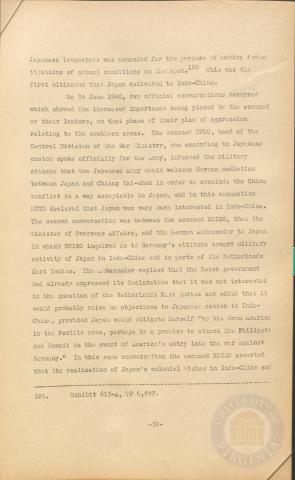
Page 50
| Parent | Japanese - German - Italian Collaboration |
|---|---|
| Date | |
| Language | English |
| Collection | Tavenner Papers & IMTFE Official Records |
| Box | Box 14 |
| Folder | Japan, Germany, Italy Collaboration and Introduction |
| Repository | University of Virginia Law Library |
Japanese inspectors was demanded for the purpose of making inves-
tigations of actual conditions on the spot. 129 This was the first ultimatum that Japan delivered to Indo-China.
On 24 June 1940, two official conversations occurred which showed the increased importance being placed by the accused or their leaders, on that phase of their plan of aggression relating to the southern areas. The accused MUTO, head of the Central Division of the War Ministry3 who according to Japanese custom spoke officially for the Army, informed the military attache that the Japanese Army would welcome German mediation between Japan and Chiang Kai-shek in order to conclude the China conflict in a way acceptable to Japan, and in this connection MUTO declared that Japan was very much interested in Indo-China. The second conversation v/as between the accused KOISO, then the Minister of Overseas Affairs, and the German Ambassador to Japan in which KOISO inquired as to Germany's attitude toward military activity of Japan in Indo-China and in parts of the Netherlands East Indies. The ambassador replied that the Reich government had already expressed its declaration that it was not interested in the question of the Netherlands East Indies and added that it would probably raise no objections to Japanese action in Indo- China, provided Japan would obligate herself "to tie down America in the Pacific area, perhaps by a promise to attack the Philippir. and Hawaii in the event of America's entry into the war against Germany." In this same conversation the accused KOISO asserted that the realization of Japan's colonial wishes in Indo-China and
129Exhibit 6l?-A, TP 6,797.
